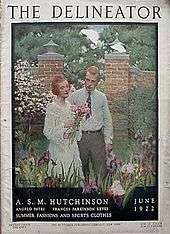Angelo Patri
Angelo Patri (November 26, 1876 – September 13, 1965)[1] was an Italian-American author and educator.

His real surname was Petraglia, and he was born in Piaggine (Salerno province) of south-western Italy. Patri came to the United States when he was five.[2][3] He gained a B.A. at the College of the City of New York in 1897, and an M.A. at Columbia University in 1904. A schoolteacher in New York from 1898 to 1908, he may have been the first Italian-born American to become a school principal in the United States.[4] In attempting to engage the student with tasks that went beyond book learning, he was influenced by the writings of John Dewey. From 1908 to 1913 he was principal of Public School No. 4, and in 1913 he became principal of Public School 45, Bronx, New York.[5] He wrote a syndicated column, "Our Children", on child psychology, for newspapers and magazines.
The Angelo Patri Middle School is named in his honor.
Works
Books for parents and teachers:
- A School Master of the Great City, 1917
- The School That Everybody Wants, 1922
- Child Training, 1922
- "Talks to Mothers", 1923 (Presented with the compliments of 'The Thomas Dalby Company' Watertown. Mass.)
- School and Home, 1925
- Problem of Childhood, 1926
- What Have You Got to Give?, 1926
- The Questioning Child, 1928
- Your Children In Wartime,[6] 1943
- How to help your child grow up (Chicago: Rand McNally, 1948)
Books for children:
- White Patch, 1911
- Pinocchio in Africa, 1911 (tr.)
- Spirit of America, 1924
- Pinocchio in America, 1928
- The Adventures of Pinocchio, 1937 (tr.)
References
- Ralph LaRossa, The Modernization of Fatherhood: A Social and Political History (University of Chicago Press, 1997: ISBN 0-226-46904-2), p. 258.
- Current Biography: Who's New and Why, 1940.
- LaRossa, The Modernization of Fatherhood, p. 257.
- LaRossa, The Modernization of Fatherhood, p. 258.
- Italian-American Who's Who, 1938.
- Angelo Patri, Your Children In Wartime, Doubleday, Doran & Company, Inc., https://archive.org/details/yourchildreninwa011519mbp